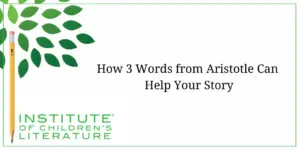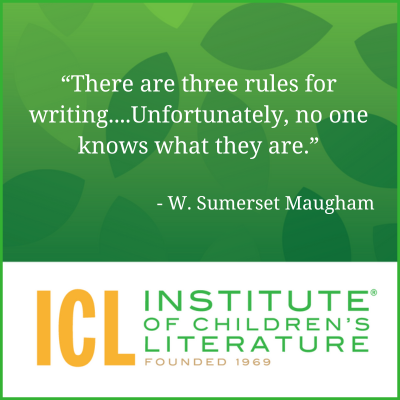
5 Ways Writers Can Prep for 2025 Goal Setting
Before we roll on to the new writing year, let’s harness our optimism for the blank slate before us and prepare for our 2025 Goal Setting just for writers.

In Aristotle’s Rhetoric, he gives the three key elements of effective persuasive communication: Logos, Ethos, and Pathos. These swanky sounding words are also things every book for young readers needs. Unsure about that? Let’s look at old Aristotle in a new light.

Logos is logic. It’s the way things are organized and the way arguments are supported. It’s the specific things that allow communication to make logical sense.
Ethos, on the other hand, is often described as the trustworthiness of the speaker. To teach you about writing, for instance, I need to get you to believe the things I will say are trustworthy. I’ll lean on my credentials as a professional writer and writing teacher for many years. I can also lean on my body of work on the subject. And I’ll make an effort to show you how you and I have similar struggles and needs. Through this, I’ll help you to believe me, trust me, and listen to me. More on that and how it relates to your stories in a minute.
Let’s add the last definition: Pathos. Pathos is emotion. When making any persuasive argument, you stand a better chance of convincing an audience if there is an emotional element. Unscrupulous speakers or persuasive writers often lean on the emotion of fear. They pick out things the reader or listener is afraid of, inflate the fear, then insist their proposal will help alleviate it. But emotion plays an essential part in fiction writing as well. Books for young readers have emotional energy. They move us. They make us care. That too is Pathos.
To sum up our definitions, logos is focused on the logic and order of the message, ethos is focused on the trustworthiness of the narrator, the reason to believe in the character and the ways we might relate, and pathos is moving the audience through emotion.
We’ve looked at the need for plots to make sense in past posts. Good plots make sense when we look at the main character’s motivation. Good plots make sense when we look at the cause and effect of the main character’s actions. Good plots make sense when we look at how the end of the story and the beginning of the story are believable for this character.

I’ve heard writers argue that it isn’t possible for their character’s behavior to be “out of character” because they wrote the book, so everything is “in character.” But that kind of argument tends to come from writers who don’t realize what they’ve created. What they thought they brought to the page and what is actually there may not align. They may think they created a character who made the journey to courage, but it isn’t believable on the page. Thus, readers will make the out-of-character complaint. The writer may have believed the character would act this way in this situation, but if he can’t make the reader believe it, the plot won’t make sense.
Equally, the plot must make sense of the setting and situation. For instance, if a story takes place in a classroom and the main character’s foe seems to have endless time to do all sorts of complicated, dreadful things, readers are going to question the logic. What’s the teacher doing during this time? If a story takes place in the dead of winter at night in the woods, but the main character is examining the fine markings on a carved artifact by the light of a full moon, the reader could find that stretches believability a bit too far. And if two main characters are hiding in an abandoned house, terrified of being discovered by the bad guy who is searching for them, they probably shouldn’t launch into a lively argument, not if you want the logic of the scene to work.
When you’re working out the logic of your plot, the question to ask over and over and over is would this happen with these people in this place and situation? If the answer is anything other than yes, you need to tune your Logos.
If you’ll remember, Ethos is what gives a speaker the credibility to speak, but for the sake of its use to help us write good fiction, let’s think of it as what makes us believe in your character. Not every character you write will be likable.

That doesn’t mean everything about the main character bears any resemblance to our lives. We aren’t stuffed donkeys who are constantly losing our tails, but many readers relate to Eeyore and his gloomy viewpoint. What is clearly a life-long condition for Eeyore is a sliver of life for all of us. And like Alexander, Eeyore is loved through it by his fellow characters. Readers relate to these characters having difficult times, even if the characters aren’t exactly a ball of fun. In fact, the Winnie the Pooh band of characters is an especially good example of how every character needs to have a sliver of the reader in him. Tigger is the reader when he’s wired and well-meaning, but with generally catastrophic results. Roo is the reader when he’s feeling pinched by how much love he gets. Pooh is the reader when he’s hungry and a little bit self-centered. Piglet is the reader when he’s timid. Because the books are for quite young children, the characters are almost caricatures. They’re slivers brought to life. But they are slivers that resonate with every young reader, which (along with excellent writing) has made for long-lasting appeal for the stories.
As you write for older and older children, your characters will be more complex and may involve a host of characteristics. Some may not have any connection for the reader, but inside each successful character is something that the reader can relate to. It’s a bit of a stretch for the meaning but think of Ethos as the common ground that the readers find with the characters that make us willing to take the story trip with those characters. In a way, we trust the main character in the story to offer us an engaging reading experience because he shares something, some element, some character trait, with us.
Stories need more than interesting and engaging characters and lively logical storylines. They need to make us feel something. The strongest stories move the reader. Part of what makes the emotional strength of any story more effective is when the clear logic kept us from asking too many distracting questions and the connection to the character made us open to feeling what he feels. Without those things, the emotional moments of a story can fall flat or feel overwritten. We won’t feel it if we don’t believe it. We won’t feel it if we don’t care about the character.

Stories can make us feel all sorts of things. Horror stories make us feel fear. Family stories can make us sad or joyous. Suspense can make us worry. One thing to keep in mind as you write emotion into your story is emotional fatigue. We can’t feel scared all the time. We can’t maintain any strong emotion for a long time. Either we’ll abandon the story because it’s too uncomfortable, or we’ll grow numb and not feel the things the writer wants us to feel. Because of this, emotion in most stories either builds slowly and gradually, or comes in waves. Fear especially will build then the wave will break and we’ll have a period of calmer, less threatening experiences that slowly build in fear again. Tension is often the same way. It builds, breaks, rests, and builds again. Even joyous stories need to build rather than expecting the reader to maintain a level of giddy excitement as they read.
As you craft your stories, Aristotle’s own rule of three can help you write the best story possible when you take care to make every step of the plot logical, ensure the reader and the main character share something that lets them connect, and encourage the reader to feel what the character is feeling. When you get this power three working harmoniously, you’re on your way to a story that readers will want to read again and again.
With over 100 books in publication, Jan Fields writes both chapter books for children and mystery novels for adults. She’s also known for a variety of experiences teaching writing, from one session SCBWI events to lengthier Highlights Foundation workshops to these blog posts for the Institute of Children’s Literature. As a former ICL instructor, Jan enjoys equipping writers for success in whatever way she can.

Before we roll on to the new writing year, let’s harness our optimism for the blank slate before us and prepare for our 2025 Goal Setting just for writers.

Writers can be thin-skinned when it comes to getting feedback on their work. Let’s look at 4 ways to positively deal with constructive criticism!

Rejection is part of the territory when it comes to being a writer. Today we offer reflection for writers to help redirect your efforts after a rejection.
1000 N. West Street #1200, Wilmington, DE 19801
© 2024 Direct Learning Systems, Inc. All rights reserved.
1000 N. West Street #1200, Wilmington, DE 19801
© 2024 Direct Learning Systems, Inc. All rights reserved.
1000 N. West Street #1200, Wilmington, DE 19801
© 2024 Direct Learning Systems, Inc. All rights reserved.
1000 N. West Street #1200, Wilmington, DE 19801
1000 N. West Street #1200, Wilmington, DE 19801
1 Comment